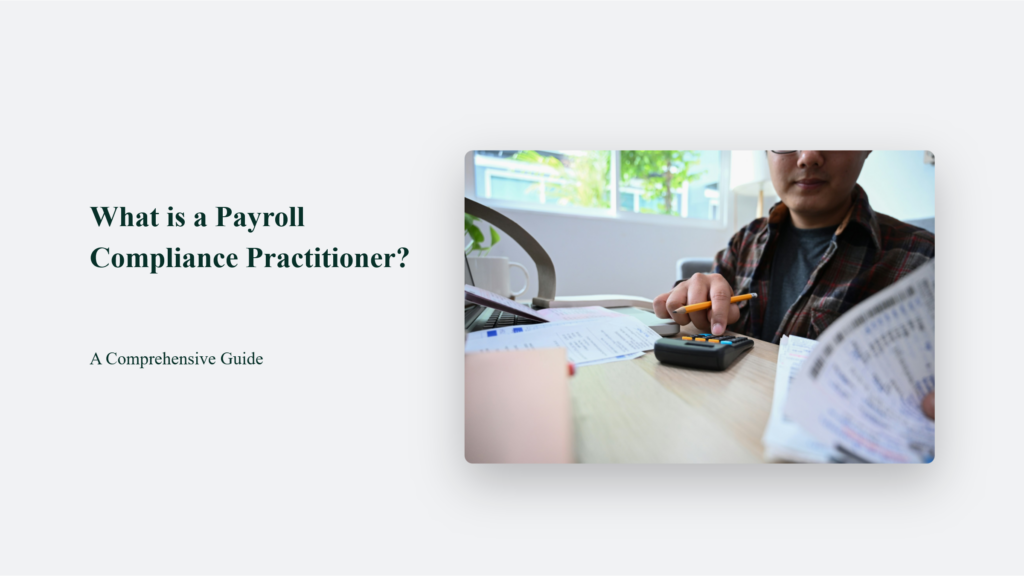

What is a Payroll Compliance Practitioner? A Comprehensive Guide

As Seen On
Few roles are as crucial as the payroll compliance practitioner (PCP) in the intricate world of business operations. This unsung hero navigates the complex labyrinth of payroll regulations, ensuring that every employee is paid accurately and on time while also keeping the company compliant with ever-changing laws and regulations.
In this comprehensive guide, we’ll dive deep into what is a Payroll Compliance Practitioner, exploring their responsibilities, the skills they need to succeed, and the profound impact they have on the success of any organization.

What is a Payroll Compliance Practitioner?
A Payroll Compliance Practitioner (PCP) is a professional who specializes in managing payroll and ensuring that all payroll processes comply with relevant laws, regulations, and standards. They are responsible for accurately calculating and processing employee wages, salaries, benefits, and deductions and ensuring that payroll taxes are properly withheld and remitted to the appropriate government agencies.
In addition to managing payroll processes, PCPs are crucial in maintaining compliance with employment laws and regulations, such as minimum wage requirements, overtime rules, tax laws, and other relevant legislation.
The Importance of Payroll Compliance
Imagine this scenario: it’s payday, and your employees eagerly await their hard-earned wages. However, due to a payroll error, some receive incorrect amounts, while others don’t get paid at all. The fallout is immediate—disgruntled employees lose trust, and there are potential legal consequences for your company. It is where a skilled PCP steps in to save the day.
A recent survey by The Workforce Institute at Kronos Incorporated found that 49% of employees would start looking for a new job after experiencing just two payroll errors. Furthermore, non-compliance with payroll regulations can result in hefty fines and penalties. In the 2020 fiscal year, the U.S. Department of Labor’s Wage and Hour Division collected over $322 million in back wages for workers. These statistics underscore the critical importance of having a competent PCP on your team.
The Role of a Payroll Compliance Practitioner
Ensuring Accurate and Timely Payments:
As an unsung hero, the PCP’s responsibilities are multifaceted and require a unique blend of technical expertise, attention to detail, and interpersonal skills.
- Ensuring Accurate and Timely Payments: The primary responsibility of a PCP is to guarantee that every employee receives their correct pay on time, every time. It involves several key tasks:
- Calculating wages, salaries, bonuses, and commissions: The PCP must thoroughly understand the organization’s compensation structure and accurately calculate each employee’s earnings based on their hours worked, position, and any additional compensation they are entitled to.
- Processing deductions for taxes, benefits, and garnishments: The PCP is responsible for ensuring that all necessary deductions are accurately calculated and withheld from each employee’s paycheck. It includes federal and state taxes, health insurance premiums, retirement contributions, and any court-ordered garnishments.
- Issuing paychecks or direct deposits: Once all calculations and deductions have been processed, the PCP must ensure that each employee receives their pay through a physical paycheck or direct deposit into their designated bank account.
- Maintaining meticulous payroll records: To ensure compliance with legal requirements and to provide a clear audit trail, the PCP must keep detailed records of all payroll transactions, including employee earnings, deductions, and tax filings.
To excel in these tasks, a PCP must possess a keen eye for detail and a thorough understanding of payroll software and systems. They must also stay up-to-date with changes in tax laws and regulations that impact payroll processing, as non-compliance can result in costly penalties and legal consequences for the organization.
Navigating Complex Regulations
In addition to ensuring accurate and timely payments, the PCP is responsible for navigating the complex web of federal, state, and local laws that govern payroll. It includes:
- The Fair Labor Standards Act (FLSA)
- The Family and Medical Leave Act (FMLA)
- The Equal Pay Act
- State minimum wage and overtime laws
A skilled PCP must be well-versed in these regulations and ensure that the company remains compliant. It involves classifying employees correctly as exempt or non-exempt, calculating overtime pay, managing leave entitlements, and filing payroll taxes accurately and on time.
Non-compliance with these regulations can result in costly penalties, legal disputes, and damage to the company’s reputation. The PCP’s vigilance and expertise are essential in mitigating these risks and protecting the organization from potential legal and financial consequences.
Collaborating with Other Departments
Payroll compliance doesn’t happen in isolation; it requires close collaboration with other departments within the organization. The PCP must work closely with:
- Human Resources: to onboard new hires, manage employee benefits, and handle terminations
- Accounting: to reconcile payroll expenses and ensure accurate financial reporting
- IT: to maintain and update payroll systems and software
Effective communication and collaboration skills are essential for a PCP to succeed in this cross-functional role and ensure seamless payroll operations across the organization.
Becoming a Payroll Compliance Practitioner: Education, Certification, and Experience
Becoming a Payroll Compliance Practitioner (PCP) requires education, certification, and relevant work experience. The specific requirements may vary by country and organization, but here are the common steps to becoming a PCP in Canada:
Education
While employers often prefer a bachelor’s degree in accounting, finance, or a related field, it is not always a strict requirement. Some employers may accept an associate’s degree or relevant work experience instead of a bachelor’s degree.
Certification
Obtaining the Payroll Compliance Practitioner (PCP) certification from the National Payroll Institute (NPI) is a crucial step in becoming a PCP in Canada. The PCP certification program consists of three core payroll courses:
- Payroll Fundamentals
- Payroll Compliance Legislation
- Payroll Fundamentals
In addition to these courses, a transfer credit for an Introduction to Accounting course is also required.
All courses and electives require a passing grade of 65% to be accepted towards the PCP designation. Courses are offered online or through approved post-secondary institutions across Canada.
Experience
To obtain the PCP designation, candidates must complete at least one year of weighted payroll work experience. This experience requirement can be fulfilled within five years before or after the start date of the candidate’s first successful attempt at the Payroll Compliance Legislation course.
Continuing Education
As payroll laws and regulations are subject to change, PCPs must stay current through ongoing professional development and training. The NPI offers various seminars and resources to help PCPs maintain their knowledge and skills.
The Bottom Line
The role of a Payroll Compliance Practitioner is not for the faint of heart. It requires a unique blend of technical expertise, attention to detail, and interpersonal savvy. However, for those who thrive in this challenging and rewarding field, the impact they make on their organizations is immeasurable. By ensuring that every employee is paid fairly and accurately while keeping the company compliant and protected, PCPs are the unsung heroes of the business world.
So, the next time you receive your paycheck, take a moment to appreciate the hard work and dedication of your company’s Payroll Compliance Practitioner. They may work behind the scenes, but their contributions are vital to the success and integrity of your organization.
Frequently Asked Questions:
How much do PCPs typically earn?
According to the Bureau of Labor Statistics, the median annual wage for payroll and timekeeping clerks was $47,580 in May 2020. However, salaries can vary widely based on factors such as location, industry, experience, and certification.
What career advancement opportunities are available for PCPs?
As you gain experience and expertise as a PCP, you may have opportunities to advance into roles such as:
– Payroll Manager
– Payroll Director
– Payroll Consultant
– Payroll Systems Analyst
Some PCPs also transition into related fields, such as human resources or accounting.
Konger
Up until working with Casey, we had only had poor to mediocre experiences outsourcing work to agencies. Casey & the team at CJ&CO are the exception to the rule.
Communication was beyond great, his understanding of our vision was phenomenal, and instead of needing babysitting like the other agencies we worked with, he was not only completely dependable but also gave us sound suggestions on how to get better results, at the risk of us not needing him for the initial job we requested (absolute gem).
This has truly been the first time we worked with someone outside of our business that quickly grasped our vision, and that I could completely forget about and would still deliver above expectations.
I honestly can't wait to work in many more projects together!
Disclaimer
*The information this blog provides is for general informational purposes only and is not intended as financial or professional advice. The information may not reflect current developments and may be changed or updated without notice. Any opinions expressed on this blog are the author’s own and do not necessarily reflect the views of the author’s employer or any other organization. You should not act or rely on any information contained in this blog without first seeking the advice of a professional. No representation or warranty, express or implied, is made as to the accuracy or completeness of the information contained in this blog. The author and affiliated parties assume no liability for any errors or omissions.

